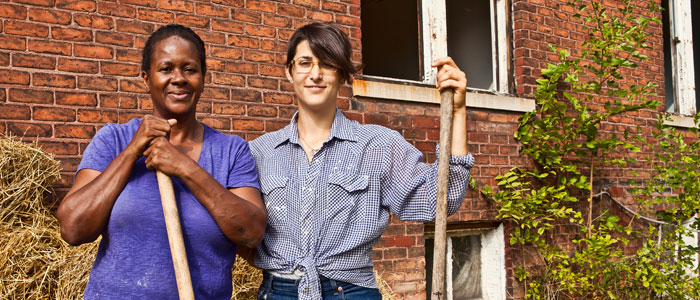by Vivian Henoch
Roseberry and Glenfield. Even the names of the streets whisper the dream of greening once again.
Amidst overgrown lots and abandoned homes on Glenfield Street just past Roseberry, a few blocks from Gratiot Avenue on Detroit’s east side, there’s an empty field that holds the promise of replanting. In the field are bales of hay and mounds of compost. In the weeks ahead the field will be turned lovingly into tidy rows of garden beds, in preparation for planting vegetables and flowers come Spring.
This is Eden Gardens
A grassroots project and collaboration between the Isaac Agree Downtown Synagogue and the neighborhood block club called Eden Gardens, the garden, which bears the block club’s name, was conceived at a Women’s Circle meeting at the synagogue last year where food activist and board member Blair Nosan spoke of the deep connections between the environment and Judaism in the notion of “tikkun olam” – healing the world. Blair’s message hit home with Karen (Chava) Knox, a member of the synagogue, resident of the Eden Gardens neighborhood and president and founder of its block club.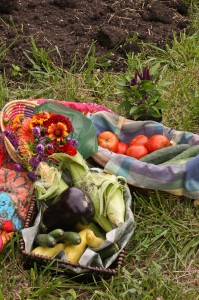
Partners in the enterprise, Chava and Blair have worked with steady determination over the past year, “planting the seeds of change,” planning events, fundraising, working the field along with volunteers from both the synagogue and the neighborhood to bring the garden to life.
Why this place?
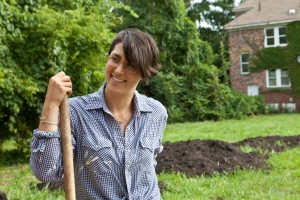
“There are lots and lots of empty lots in the city,” says Blair. “Every neighborhood has lots to spare. But to have relationships with the residents of the neighborhood and to be excited about starting a garden together feels different. We’re taking shared responsibility for this lot, and I’m here because of my relationship to Chava and the block club. The opportunity to create a Jewish point of entry that exists outside the boundaries of midtown and downtown was also a huge draw.”
Beyond the practical use of the garden – growing produce for the residents of the neighborhood and the synagogue – there’s the community connection.
“Our purpose is to foster friendship between our two communities,” observes Blair. “Just as our synagogue provides a welcoming place where we can express our unity – as well as our diversity – the garden is a haven for cross-cultural relationships, education and connection.”
A pickler with a passion
Born in West Bloomfield, a U of M graduate in liberal arts, Blair turned her academic pursuits to farming and the Jewish agricultural-based fellowship program called ADAMAH in Connecticut, where she spent nearly a year. Returning to her Jewish roots, three years ago, Blair came back to Detroit as an Americorps apprentice in urban agriculture and launched Suddenly Sauer, her own artisan pickling business based in her kitchen. Blair dreams of creating comprehensive experiential Jewish education in environment and social justice, but in the meantime she can be found, sleeves rolled up, boots on the ground, testing soil, mentoring and leading volunteers, teaching and sharing her expertise and passion for growing food and nurturing neighborhood connections.
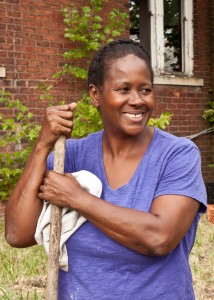
Reclaiming the neighborhood, lot by lot
Chava is another Detroiter who has come home again. A graduate of Marygrove College in Performing Arts, Chava spent 12 years in L.A. pursuing her career in acting, and working with children in Beverly Hills Unified School District. A few years ago, she decided that she needed to live closer to family, so she returned to the home she still owned on Glenfield. “It was a shock to see how much the neighborhood had deteriorated,” she recalls, “We created the Eden Gardens block club to rebuild the neighborhood, to get grants to help people in the area fix their homes as a means to buy and invest in the community. It’s our goal to see our neighborhood grow into a stronger, caring and more supportive community, one in which families want to move back . . . Being a member of the Downtown Synagogue has allowed me to have two hands that connect two communities, while building and bringing a lasting relationship with the Downtown Synagogue and the community of Eden Gardens.
“Seed money” on fertile grounds for learning
Among the many objectives of creating and maintaining Eden Gardens Farm is to establish an educational program once the crops are planted in spring 2013. “The garden is a learning place,” says Chava, “because it’s important to know the fundamentals of nutrition and where our food actually comes from.” In partnership with the Jewish Women’s Foundation of Metropolitan Detroit ( JWF), the Isaac Agree Downtown Synagogue received a grant of $8,000 to lay the groundwork for programming offering gardening and health education, along with a variety of workshops on food prep and preservation and rituals centered around the holidays.
“The JWF is excited 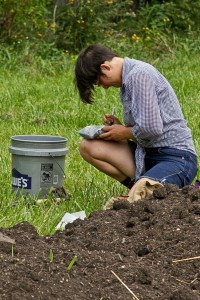 to partner with the congregants of the IADS in their collaboration with the Eden Gardens Block Club to empower women to achieve a measure of self-sufficiency by growing their own food,” states Carolyn Tisdale, JWF chair. “We see the program as a natural for fostering lasting friendships between the Jewish community of the IADS and their neighbors in Detroit, and contributing to the revitalization of our city.”
to partner with the congregants of the IADS in their collaboration with the Eden Gardens Block Club to empower women to achieve a measure of self-sufficiency by growing their own food,” states Carolyn Tisdale, JWF chair. “We see the program as a natural for fostering lasting friendships between the Jewish community of the IADS and their neighbors in Detroit, and contributing to the revitalization of our city.”
The wish list
There’s a hint of rain in the air, but the morning is warm, as we find Blair and Chava working together in the garden. As they lay handfuls of hay over the “lasagna beds” (layers of cardboard, compost and garden waste) that will be laid to rest over the winter in preparation for planting next spring, we ask them to envision the garden in bloom next year. What would it take, what do you still need and what do you wish for? Here’s how they answered our questions.
1. Volunteers. They are the key. We’re here to work together and to grow together, because it feels good, and what feels good is also good for the soul.
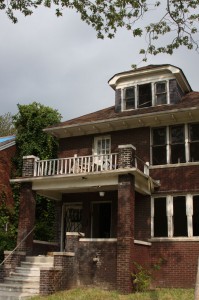
2. Funds and community support. The block club ultimately wishes to buy and rehab the house that borders the garden lot. The house would function as a place to store equipment, to hold classes, block club meetings, a possible water source, and maybe someday a fresh food store. The block club is already making plans to clean out the house this fall.
3. A commercial riding lawn mower to expedite the process of caring for vacant neighborhood lots.
4. Funds for more advanced irrigation. We’ll use rain barrels until we can afford to have a more advanced water-source.
5. Last but not least, a small tractor.
Come, celebrate. Sukkot at Eden Gardens Farm, October 7th at noon.
In partnership with Congregation T’chiyah under the leadership of Rabbi Shawn Zevit. Explore Sukkot, it’s agricultural roots, and work with Eden Gardens block club to sow the first crop of garlic and together contemplate L’dor v’dor. For more information about the Farm, including volunteer opportunities, contact the Isaac Agree Downtown Synagogue, 313-962-4047, hello@downtownsynagogue.org

